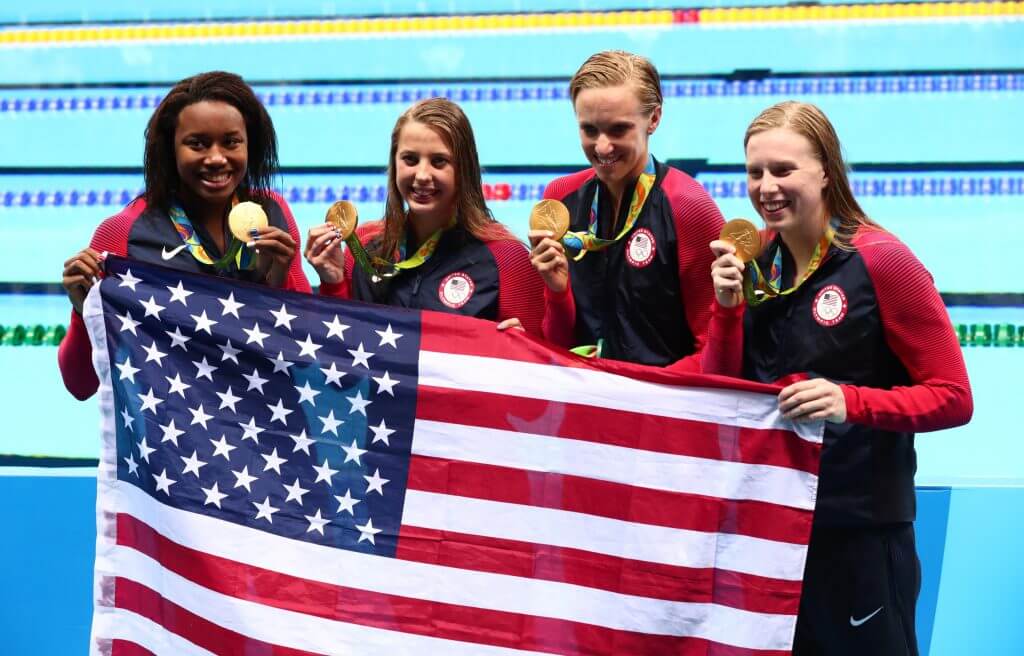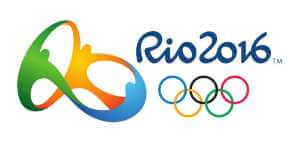Three Sophomores and a Mom Reclaim Women’s Medley Relay


Editorial Coverage Sponsored By FINIS
By David Rieder.
One year ago, the United States capped off a shaky performance at the World Championships in Kazan with a fourth-place finish in the women’s 400 medley relay. The traditionally-strong and oftentimes-dominant U.S. squad finished more than a second behind third-place Australia and almost two-and-a-half behind World Champion China.
It was a performance to forget—quickly.
No one is talking about Kazan right now—in the span of a year, the U.S. team doubled its gold medal count (eight to 16) this week at the Olympic Games and won an additional 10 more medals than it did in Kazan, even with 10 less events on the Olympic program.
After what had already transpired that week at Worlds, few expected much out of the women’s medley relay, especially since no Americans had won a medal in any of the 100-meter events, and no one even made the final in either the 100 fly or 100 breast.
In contrast, the U.S. women won medley relay gold by almost two seconds Saturday night in Rio, even without all four members swimming up to the lofty standards they had set for themselves in their individual performances.
Leading things off was Kathleen Baker, hardly the consensus pick as the top American backstroker after she failed the make the championship final of either the 100 or 200-yard back at the NCAA championships in March. Baker, who admitted in July that she had been dealing with Crohn’s Disease for years, kept battling.
She finished second to Olivia Smoliga in the 100 back at Olympic Trials in 59.29 and then dropped another half-second in Rio to wind up with an individual silver medal. Among Americans, only Missy Franklin has surpassed Baker’s new best time of 58.75.
Baker followed up her individual efforts with a solid 59.00 leadoff leg on the relay that put the United States right in the mix.
“I’m completely shocked that I get to come away from this meet with a gold and a silver medal,” Baker said. “To be on the night relay and experience that with all my teammates, as well as get to hear everyone cheering for me along the way is just the best feeling in the world right now.”
Next up was Lilly King, who made headlines this week after she called out Russian breaststroker Yulia Efimova for her checkered doping record and multiple past suspensions.
“I had never intended on speaking out,” King said. “It just kind of happened. Going along with the finger wagging thing, I was being filmed in the ready room—I wasn’t aware I was being filmed. After my race, I came out and answered the question. It wasn’t an attack on a certain country, but it was just me saying that doping shouldn’t be a thing.”
That whole incident started in the semifinals, and after that, King knew when it did that she would have to back up her words in the final and beat Efimova—or else end up eating her words.
King did just that, winning gold in 1:04.93 in her first international meet while Efimova faded and ended up with the silver. But King was not done racing, even as she spent several days as a favorite headline subject for the American press.
Her 200 breast was nothing special—she missed making the final—and neither was her split on the 400 medley relay, a 1:05.70. King’s stroke tempo looked rushed and inefficient, and Efimova actually went faster with a 1:04.93.
But that did not matter—the rookie had given herself such a cushion ahead of the rest of the world that King still out-split everyone else and put Dana Vollmer in position to take the lead.
Vollmer delivered. The 100 fly world record-holder-turned-mother-turned-comeback queen backed up her 100 fly bronze medal from a week earlier with a sizzling 56.00 split, the fastest in the field.
The lead was more than a second as Vollmer handed over to Simone Manuel, and there was no reason to believe Manuel was going to let the Americans down. For all of the American breakout stories of the week—think Baker, King, Ryan Murphy and Maya DiRado—Manuel’s was perhaps the least expected but for the longest time seen coming.
17 months ago, Manuel stunned the country at the NCAA championships in Greensboro, winning both the 50 and 100-yard free and setting a new American record in the 100. Her efforts as Stanford’s relay anchor were legendary.
But when she failed to take a step forward in her long course career at the World Championships that summer or—after a redshirt year from college swimming—Olympic Trials, it became easy to wonder if she ever would.
“I haven’t had the best long course seasons,” Manuel said. “I put in all the hard work the whole time. I don’t think all the results were indicative of how hard I was working at the time.”
That narrative went out the window Thursday night when Manuel shocked the world and tied for gold in the women’s 100 free, crushing the American record with a 52.70. She made history as the first black American swimmer to win individual Olympic gold, and she spoke of her desire to be a role model and a catalyst for creating a world where she was not “Simone the black swimmer.”
But before any of that could happen, there was business to attend to. Manuel had two finals on her plate for the last night of the Olympic Games, the 50 free and then the 400 medley relay, which she would anchor.
Swimming in lane seven in the individual final, Manuel put together a 24.09, blowing away her previous best of 24.33, and she won the silver, just two one-hundredths behind Denmark’s Pernille Blume.
Typically, when a swimmer wins a silver medal but misses out on the gold by two one-hundredths, her emotions would be mixed—a great swim, sure, but so painful to be so close.
Whatever Manuel felt, she pushed them out of her head. Almost instantaneously after touching the wall, she flew over the lane lines across the pool and darted back into the warmup area. Still more business to go.
After receiving her silver medal for the 50, Manuel dove into the water to anchor the relay with clean water on either side of her. The only returning member from the fourth-place relay in Kazan, Manuel delivered an exceptional 52.43 split, and the American women had their second-straight Olympic gold in the medley relay, this one in dominant fashion.
“Don’t overlook how tough she was last night,” said Nathan Adrian, who anchored the American men’s medley relay to a gold of their own moments later. “I think the NCAA meets prepare her for that. Getting out of a silver in the 50 free and then going out to anchor the 400 medley relay and winning another gold. That’s pretty cool.”
Geographically, the U.S. team was about as far away from Kazan as it could have been. Performance-wise, they were even further.
“Everybody has highs and lows, and when we’re at our lows, we bring each other up,” Manuel said. “We don’t know how, but that’s what we do, and that’s why we walked away with 33 medals at the Olympics. You want your best meet to be at the Olympics.
“We would have liked to have a better World Championships, but I think we’re pretty happy with how we performed here.”
The Americans finished with more than three times as many medals at the next-best team in the pool—which was Australia, with ten. Conveniently, at Team USA’s day-after press conference Sunday afternoon, an Australian reporter prefaced his question with an apt summary of the week.
“We kind of wish you didn’t do as well as you did,” he said. “I apologize because you guys were brilliant in the pool.”


- OFFICIAL SITE FOR RIO
- RIO COMPETITION SCHEDULE
- WHERE TO WATCH LIVE VIDEO OF OLYMPICS
- USA MEN'S SWIMMING TEAM
- USA WOMEN'S SWIMMING TEAM
- USA DIVERS GOING TO RIO
- USA WOMEN WATER POLO TEAM
- SWIMMING MEDAL PREDICTIONS
- FULL DAY 1 RESULTS
- FULL DAY 2 RESULTS
- FULL DAY 3 RESULTS
- FULL DAY 4 RESULTS
- FULL DAY 5 RESULTS
- FULL DAY 6 RESULTS
- FULL DAY 7 RESULTS
- FULL DAY 8 RESULTS
- WOMEN'S 10K OPEN WATER RESULTS
- MEN'S 10K OPEN WATER RESULTS
- FULL OLYMPIC SWIMMING RESULTS



